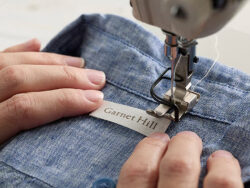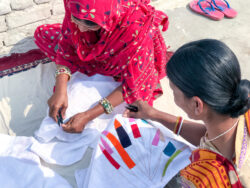We look to collaborate with suppliers and third-party organizations to increase product ingredient transparency and traceability (e.g., certifying products to respected standards).
QVC Group is committed to providing products customers can trust. Material sourcing transparency means sharing information about how and where a product is made, and what it is made from. This includes disclosing data relating to the environmental and social impact of a product.
Policies & Standards
Disclosure of our business policies and standards is vital to our transparency work. We have policies for items and materials we will not sell, whether for ethical or quality reasons. Sharing information about our business policies and standards creates accountability and drives responsibility.
Visit Our Foundations page to read more.
Supply Chain Transparency
Supply-chain transparency is the practice of sharing information by disclosing the details of facilities involved in the manufacturing and production of our products. It involves knowing what is happening upstream in the supply chain and communicating this knowledge both internally and externally. Transparent supply chains verify the origin and flow of materials, parts, and finished products.
Our factory list shares the details of our Tier 1 factories that produce our apparel and/or home products direct sourced and sold at retail by QVC and HSN. Information shared includes name, location, address and the product type. We are continuously working to share more factory information with the goal to allow full supply-chain transparency.
Visit our Tier 1 Factory List.
Traceability
Making traceability easy for consumers to understand is a big part of our journey, and we try to give people tools that inform and empower them to choose. Our brands continue to expand the range of products made with traceable sustainable fibers.
To enhance our supply chain visibility, we began auditing QVC and HSN private-label products containing certain high-risk raw materials whose supply chains may overlap with high-risk regions. We subsequently expanded the scope of these audits to address additional high-risk raw materials. Traceability audits look upstream through the various tiers of the products’ supply chains to trace the product ingredients all the way back to the supplier of the raw materials.
Stakeholder Collaboration
Our commitment to partnering and working together within, and across, industries aligns with UNSDG 17 which recognizes multi-stakeholder partnerships as important vehicles for mobilizing and sharing knowledge, expertise, and technologies to come up with shared sustainable solutions.
Textile Exchange
QVC US and Garnet Hill have been longstanding members of the Textile Exchange - a comprehensive, industry-wide organization that is tackling challenging production issues facing the textile industry. These include water use, carbon emissions, energy use and its effects on climate change, waste production and the use of toxic materials. The Textile Exchange brings together stakeholders through the entire supply chain – from product brands and retailers, to manufacturers and raw material suppliers, to farmers and other key stakeholders – to develop models and tools that support a greater use of sustainable materials and raise consumer awareness about the value of such textiles and the products that contain them.

Photo courtesy of Garnet Hill
Sustainable Fiber Alliance (SFA)
Garnet Hill became a member of the Sustainable Fiber Alliance to ensure high social, environmental, and animal welfare standards are met for its premium cashmere products. The SFA is a non-profit organization that aims to minimize the environmental impact of cashmere and other animal fibers, safeguard livelihoods and improve animal welfare standards.
Nest Coalition
QVC Group is a member of the Nest Coalition a multi-stakeholder initiative designed to bring industry leaders together to tackle challenges in ethical sourcing, supply chain transparency, and climate impact.
Nest helps improve the safety of handworkers by working with participants that have completed a Nest assessment, fully compliant written policies, and procedures to protect and support workers within their supply chains. Additionally, 72% of participants who complete a Nest assessment have successfully mapped their supply chains to know where and how many workers are present, even outside of traditional factories improving transparency.

Photo Courtesy of Nest & Sara Otto
Certifications & Standards
Material traceability involves disclosing information about how, where and what a product is made from. It’s involves sharing data related to the environmental and social impact of a product. Our vision is to increase the visibility of our supply chain by investing in sourcing more products made from sustainable materials. Our brands continue to seek opportunities to expand the range of products made with sustainable fibers. They also continue to deepen their history of promoting sustainable fibers by adding more products made from certified sustainably-grown and certified-renewable wood sources, to reduce the use of conventional synthetic fibers.
Garnet Hill
Committed to sourcing responsibly, Garnet Hill is proud to partner with reputable third-party auditors to help ensure transparency in their business practices. Current certifications include SFA, European Flax®, Global Recycled Standard, Responsible Down Standard and OEKO-TEX® certifications Over 40% of units sold are products with a certification (even two certifications on some products) with hopes to continue to expand each year.
To learn more about Garnet Hill’s certified-sustainable fibers & fabrics please visit their Our Fibers & Fabrics page.
QVC US
QVC US sources a large portion of denim for its private label ranges with fabrics made using REPREVE®, a breathable material derived from postconsumer plastic bottles. Additionally, it incorporates REPREVE® Our Ocean fibers, which are sourced from plastic waste collected near waterways and coastal areas. QVC US also continued its partnership with LENZING™, utilizing ECOVERO™ viscose made from certified renewable wood through ecologically responsible processes.






